-

新人教版高中英语必修3Unit 3 Diverse Cultures-Reading for Writing教学设计
The topic of this part is “Describe a place with distinctive cultural identity”.This section focuses on Chinese culture by introducing Chinatown, whose purpose is to show the relationship between the Chinese culture and American culture. The Chinese culture in Chinatown is an important part of American culture. Chinatown is an important window of spreading Chinese culture and the spirit homeland of oversea Chinese, where foreigners can experience Chinese culture by themselves.Concretely, the title is “Welcome to Chinatown!”, from which we can know that the article aims at introducing Chinatown. The author used the “Introduction--Body Paragraph--Conclusion” to describe the people, language, architecture, business, famous food and drinks and people’s activities, which can be a centre for Chinese culture and shows its unique charm.1. Read quickly to get main idea; read carefully to get the detailed information.2. Learn the characteristics of writing and language.3. Learn to introduce your own town according to the text.4. Learn to correct others’ writing.1. Learn the characteristics of writing and language.2. Learn to introduce your own town according to the text.Step 1 Lead in ---Small talkIn the reading part, we mentioned the Chinatown of San Francisco. How much do you know about Chinatown of San Francisco ?Chinatown is a main living place for Chinese immigrants, where you can see many Chinese-style buildings, costumes, operas, restaurants, music and even hear Chinese.Step 2 Before reading ---Predict the contentWhat is the writer’s purpose of writing this text ? How do you know ?From the title(Welcome to Chinatown) and some key words from the text(tourist, visit, visitors, experience), we can know the purpose of the text is to introduce Chinatown and show the relationship between Chinese culture and American culture.

新人教版高中英语必修3Unit 4 Space Exploration-Listening&Speaking&Talking教学设计一
Listening and Speaking introduces the topic of “talking about how to become an astronaut”. This period is aimed to inform students some details about the requirements of being an astronaut. Students can be motivated and inspired by the astronauts. Teachers ought to encourage students to learn from them and let them aim high and dream big.Listening and Talking introduces the theme of "talk about life in space". This part also informs students more details about life in space and can inspire students to be curious about this job. 1. Guide students to listen for numbers concerning dates, years and ages etc2. Cultivate students' ability to talk about how to become an astronaut and life in space ; 3. Instruct students to use functional sentences of the dialogue such as “ first of all, I am not sure, so what might be .. I guess.. I wonder…I am curious…)appropriately.1. Guide students to understand the content of listening texts in terms of the whole and key details; 2. Cultivate students' ability to guess the meaning of words in listening; discuss with their peers how to become a qualified astronaut and describe the life in space.Part 1: Listening and SpeakingStep 1: Lead inPredictionThe teacher can ask students to predict what the listening text is about by looking at the pictures.About how to become an astronaut./the requirements of an astronautStep 2: Then, play the radio which is about an interview a. And after finishing listening for the first time, the students need to solve the following tasks.

新人教版高中英语必修3Unit 4 Space Exploration-Listening&Speaking&Talking教学设计二
The themes of this part are “Talk about how to become an astronaut” and “Talk about life in space”. As Neil Armstrong said “Mystery creates wonder and wonder is the basis of man’s desire to understand. Space is difficult for human to reach, therefore, humans are full of wonders about it. However, if wanting to achieve the dream of reaching the Moon, some of our human should work hard to be an astronaut at first. Part A(Talk about how to become an astronaut) is a radio interview in a radio studio, where the host asked the Chinese astronauts about his story how to become an astronaut. Yang Liwei told his dreamed to be an astronaut since childhood. Then he worked hard to get into college at 22. The next 10 years, he gradually became an experienced pilot. At the same time, to be an astronaut, he had to study hard English, science and astronomy and trained hard to keep in good physical and mental health and to practise using space equipment. Part B (Talk about life in space) is also an interview with the astronaut Brown, who is back on the earth. The host Max asked about his space life, such as his emotion about going back the earth, the eating, shower, brushing, hobbies and his work. Part A and Part B are interviews. So expressing curiosity about the guests’ past life is a communicative skill, which students should be guided to learn.1. Students can get detailed information about how Yang Liwei became an astronaut and Max’s space life.2. Students learn to proper listening strategy to get detailed information---listening for numbers and taking notes.3. Students can learn related sentences or phrases to express their curiosity like “ I wish to know...” “I’d love to know...”4. Students can learn more about the space and astronauts, even be interested in working hard to be an astronaut

新人教版高中英语必修3Unit 4 Space Exploration-Reading for Writing教学设计二
⑦在我看来, 探索太空是值得的。As far as I am concerned, it is worthwhile to explore the space.Step 10 Writing---draftRecently, students in our class have had heated a discussion on whether space is worth exploring. Students hold different ideas about it.30% of us think space exploration is not worthwhile. They think space is too far away from us and our daily life and is a waste of money. And the money spent on space exploration can be used to solve the earth’s problems such as starvation and pollution.On the other hand,70% think space is worth exploring because we have benefited a lot from it,such as using satellites for communication and weather forecast. What’s more,with further space research,we may solve the population problem by moving to other planets one day. Also,space research will enable us to find new sources to solve the problem of energy shortages on the earth.As far as I am concerned, it is worthwhile to explore the space. Not only can it promote the development of society but also enrich our life. Step 11 Pair workExchange drafts with a partner. Use this checklist to help your partner revise his/her draft.1.Does the writer explain why he/she changed/wanted to change?2.Does the writer tell how the changes have improved or will improve his/her life?3.Is the text well-organised?4.Does the writer use words and expressions to show similarities and differences?5.Are there any grammar or spelling errors?6.Does the writer use correct punctuation?

新人教版高中英语必修3Unit 5 The Value of Money- Discovering Useful Structure教学设计
Step 3 Meaning1. 过去将来时表示从过去某一时间来看将要发生的动作或存在的状态, 常用在宾语从句中。一般由“would/should +动词原形”构成。She hoped that they would meet again someday. 她希望将来有一天他们能再见面。2. was/were going to+动词原形: 表示过去将要发生或很有可能发生的动作, 常用于口语中, 表示预言、意图或者打算等。He was going to start work the following week. 他打算下星期开始工作。3. was/were about to do: 常用来表示即将发生的动作, “刚要/正要做……”。注意该结构不与任何时间状语连用。I felt that something terrible was about to happen. 我感到某种可怕的事情即将发生。4.was/were to do: 表示“曾计划做某事”, 如果表示“本来计划做某事, 动作没实现”, 则需用 “was/were to have done”。She said she was to have told me about the accident. 她说她本来想告诉我关于事故的事。5.Start, go, come, leave, see, meet等动词的过去进行时: 表示就过去某一时刻而言即将发生的动作。She was coming later. 她随后就来。I had just put on my overcoat and was leaving to visit a friend of mine. 我刚穿上外套要去看我的一个朋友。

新人教版高中英语必修3Unit 5 The Value of Money-Listening &Speaking教学设计
Step 4: Listen again and decide if the following statements are true (T) or false (F).1 It was the first time Chen Liyan's story was reported. T口 F口2 Chen found 10,000 yuan in a small plastic bag in Taiyuan railway station口 F口3 Wang Zheng apologized to Chen because he couldn't offer her more money. T口 F口4 Chen took out a large loan to cure her daughter, T口 F口5 Wang set up a fundraising website for Chen's daughter after Chen told him about her situation. T口 F口Step 5:After listening, discuss the questions.1 What kind of person do you think Chen Liyan is?Chen Liyan is generous and honest because she returned a large sum of money to the owner.2 Did Chen return the money because she didn't need it?No. She returned the money because it was the right thing to do. Evidence for this is that she refused to accept the reward money because she felt that it had not been earned. 3 Is it common for people to do what Chen did?It depends on the culture. In some countries it is quite common to return money that has been found. In other countries, people believe "Finders are keepers!" 4 How did Wang Zheng feel about the return of his money?He must have been very happy and relieved to have gotten his money back. We know this because he thanked Chen repeatedly and even offered her a reward.5 Why did Ma Dongbao tell Wang about Chen's family?He must have had great sympathy for Chen and her daughter and wanted to help them.'We know this because he arranged help for them. 6 How did the news reporter feel about Chen's actions?The news reporter felt that it showed that money wasn't the most important thing in life. We know this because the reporter told us that this is what Chen believes. and then said, “that's a great attitude to take."

新人教版高中英语必修3Unit 5 The Value of Money-Reading and Thinking教学设计一
Everybody wants to get wealth.In today’s material world,making money or becoming wealthy symbolizes a person’s success and capability. Many people just make every effort, pay any price to attain greater wealth. With money,they can buy nice, large apartments in nice neighborhood. With money they can own luxurious cars. Wealth seems to bring all happiness in life.But is wealth the only road to happiness? Not really. There are many things in the world, which are beyond the means of money, such as friendship, love, health and knowledge. People are so preoccupied with struggling for money that they have no time or would not take the time to form or maintain friendship. What happiness can they feel living as lonely miserable creatures without love or friends in the world even if they accumulate tremendous wealth?In my opinion, people can’t do anything without money, but money is not everything. What money will bring you depends on your personal belief and goal in life. If you are kind enough to help others, especially the poor, money is a good thing to you. With it, you can do much more for the benefit of people and your country, and it will add to your own happiness. If you want money just for your own needs, you’ll never be satisfied or happy. In a word,you should have money spent for more people. Only then can money be the source of your happiness.Step 8 Homework4 students in a group, one acts Roderick, one Oliver, one servant and the fourth one acts Henry Adams, then listen to the tape, pay more attention to the difference between American English and British English in pronunciation, stress, tone.

新人教版高中英语选修2Unit 4 Journey Across a Vast Land教学设计
当孩子们由父母陪同时,他们才被允许进入这个运动场。3.过去分词(短语)作状语时的几种特殊情况(1)过去分词(短语)在句中作时间、条件、原因、让步状语时,相当于对应的时间、条件、原因及让步状语从句。Seen from the top of the mountain (=When it is seen from the top of the mountain), the whole town looks more beautiful.从山顶上看,整个城市看起来更美了。Given ten more minutes (=If we are given ten more minutes), we will finish the work perfectly.如果多给十分钟,我们会完美地完成这项工作。Greatly touched by his words (=Because she was greatly touched by his words), she was full of tears.由于被他的话深深地感动,她满眼泪花。Warned of the storm (=Though they were warned of the storm), the farmers were still working on the farm.尽管被警告了风暴的到来,但农民们仍在农场干活。(2)过去分词(短语)在句中作伴随、方式等状语时,可改为句子的并列谓语或改为并列分句。The teacher came into the room, followed by two students (=and was followed by two students).后面跟着两个学生,老师走进了房间。He spent the whole afternoon, accompanied by his mom(=and was accompanied by his mom).他由母亲陪着度过了一整个下午。

新人教版高中英语选修2Unit 1 Science and Scientists-Reading and thinking教学设计
Step 5: After learning the text, discuss with your peers about the following questions:1.John Snow believed Idea 2 was right. How did he finally prove it?2. Do you think John Snow would have solved this problem without the map?3. Cholera is a 19th century disease. What disease do you think is similar to cholera today?SARS and Covid-19 because they are both deadly and fatally infectious, have an unknown cause and need serious public health care to solve them urgently.keys:1. John Snow finally proved his idea because he found an outbreak that was clearly related to cholera, collected information and was able to tie cases outside the area to the polluted water.2. No. The map helped John Snow organize his ideas. He was able to identify those households that had had many deaths and check their water-drinking habits. He identified those houses that had had no deaths and surveyed their drinking habits. The evidence clearly pointed to the polluted water being the cause.3. SARS and Covid-19 because they are both deadly and fatally infectious, have an unknown cause and need serious public health care to solve them urgently.Step 6: Consolidate what you have learned by filling in the blanks:John Snow was a well-known _1___ in London in the _2__ century. He wanted to find the _3_____ of cholera in order to help people ___4_____ it. In 1854 when a cholera __5__ London, he began to gather information. He ___6__ on a map ___7___ all the dead people had lived and he found that many people who had ___8____ (drink) the dirty water from the __9____ died. So he decided that the polluted water ___10____ cholera. He suggested that the ___11__ of all water supplies should be _12______ and new methods of dealing with ____13___ water be found. Finally, “King Cholera” was __14_____.Keys: 1. doctor 2. 19th 3.cause 4.infected with 5.hit 6.marked 7.where 8.drunk 9.pump 10.carried 11.source 12.examined 13.polluted 14.defeatedHomework: Retell the text after class and preview its language points

新人教版高中英语选修2Unit 2 Bridging Cultures-Discovering useful structures教学设计
The grammar of this unit is designed to review noun clauses. Sentences that use nouns in a sentence are called noun clauses. Nominal clauses can act as subject, object, predicate, appositive and other components in compound sentences. According to the above-mentioned different grammatical functions, nominal clauses are divided into subject clause, object clause, predicate clause and appositive clause. In this unit, we will review the three kinds of nominal clauses. Appositive clauses are not required to be mastered in the optional compulsory stage, so they are not involved.1. Guide the students to judge the compound sentences and determine the composition of the clauses in the sentence.2. Instruct students to try to learn grammar by generalizing grammar rules, controlling written practice, and semi-open oral output.3. Inspire the students to systematize the function and usage of noun clause1.Instruct students to try to learn grammar by generalizing grammar rules, controlling written practice, and semi-open oral output.2.Inspire the students to systematize the function and usage of noun clauseStep1: The teacher ask studetns to find out more nominal clauses from the reading passage and udnerline the nominal clauses.

新人教版高中英语选修2Unit 3 Food and Culture-Reading and thinking教学设计
The discourse explores the link between food and culture from a foreign’s perspective and it records some authentic Chinese food and illustrates the cultural meaning, gerography features and historic tradition that the food reflects. It is aimed to lead students to understand and think about the connection between food and culture. While teaching, the teacher should instruct students to find out the writing order and the writer’s experieces and feelings towards Chinese food and culture.1.Guide the students to read the text, sort out the information and dig out the topic.2.Understand the cultural connotation, regional characteristics and historical tradition of Chinese cuisine3.Understand and explore the relationship between food and people's personality4.Guide the students to use the cohesive words in the text5.Lead students to accurately grasp the real meaning of the information and improve the overall understanding ability by understanding the implied meaning behind the text.1. Enable the Ss to understand the structure and the writing style of the passage well.2. Lead the Ss to understand and think further about the connection between food and geography and local character traits.Step1: Prediction before reading. Before you read, look at the title, and the picture. What do you think this article is about?keys:It is about various culture and cuisine about a place or some countries.

新人教版高中英语选修2Unit 5 First Aid-Discovering useful structures教学设计
You have no excuse for not going.你没有理由不去。He was punished for not having finished his homework.他因未完成作业而受到惩罚。2.动词ing形式复合结构由物主代词或人称代词宾格、名词所有格或普通格加动词ing,即“sb./sb.'s+doing”构成。动词ing形式的复合结构实际上是给动词ing形式加了一个逻辑主语。动词ing形式的复合结构有四种形式:①形容词性物主代词+动词ing②名词所有格+动词ing③代词宾格+动词ing④名词+动词ingHer coming to help encouraged all of us.她来帮忙鼓舞了我们所有人。The baby was made awake by the door suddenly shutting.这个婴儿被突然的关门声吵醒了。Can you imagine him/Jack cooking at home?你能想象他/杰克在家做饭的样子吗?无生命名词无论是作主语还是作宾语都不能用第②种形式。Tom's winning first prize last year impressed me a lot.汤姆去年得了一等奖使我印象深刻。Do you mind my/me/Jack's/Jack leaving now?你介意我/杰克现在离开吗?Excuse me for my not coming on time.很抱歉我没能按时来。His father's being ill made him worried.他父亲病了,他很担心。We are looking forward to the singer's/the singer to give us a concert.我们盼望着这位歌手来给我们举办一场演唱会。
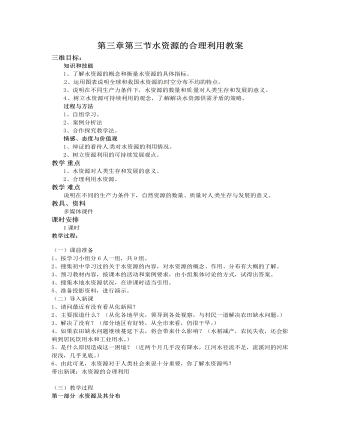
人教版高中地理必修1第三章第三节水资源的合理利用教案
5、请列举开源的措施。(包括合理开发和提取地下水;修筑水库;开渠引水实行跨流域调水;海水淡化;人工增雨等。6、开源“五水”歌:开发地下水、蓄积洪水,跨流域调水,淡水海水,人增雨水。能马上背出来吗?7、请列举节流的措施。(包括加强宣传教育,提高公民节水意识;重视改进农业灌溉技术,提高工业用水的重复利用率等。)8、水资源时刻影响着我们的生存和发展,尽管我们已经学习了关于如何合理利用水资源的知识,但关键还是要研究问题和解决问题,面对复杂的生活环境,具体问题要具体分析,看课本70页“活动”,请小组派代表回答问题。提示:(1)西北地区的水资源供给,从可持续发展的角度,解决水资源的供求矛盾应体现在:控制人口数量,减少用水规模;发展节水农业;保护生态环境,退耕还林还草。(2)我国缺水问题,谈谈看法:通过电视、报纸杂志、互联网收集有关水资源的资料;确定综合思维、立体思维的方法,全面多角度地寻找解决缺水的对策。
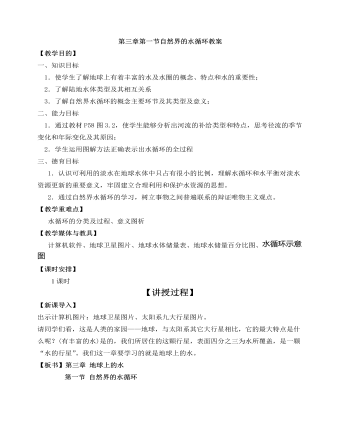
人教版高中地理必修1第三章第一节自然界的水循环教案
浅层地下水是贮存于地表松散堆积物中的潜水。主要受降水、气温、蒸发等气象因素影响,有明显的季节变化与日变化,并与河水有相应补给关系,即河水高于潜水面时,河水补给地下水,反之地下水补给河流;深层地下水是长时间内渗入地下深入储存起来的,它缓慢地流出补给河流,受气象因素影响很小,通常只有年变化,季节变化已不明显。当然,一条河流的河水补给来源往往不是单一的,而是以某一种形式为主的混合补给形式,对流域自然条件复杂的大的河流来说尤其如此。我国长江上游地区除雨水、地下水外,高原高山上冰川、积雪在夏季融化也补给河流;东北地区的河流,由春季融化积雪补给,夏季则由雨水和地下水补给;西北内陆盆地除雨水外,夏季高山冰川、积雪融化成为河流的主要补给形式。我国季风地区,大部分河流以雨水补给为主,而冬季则由地下水补给。
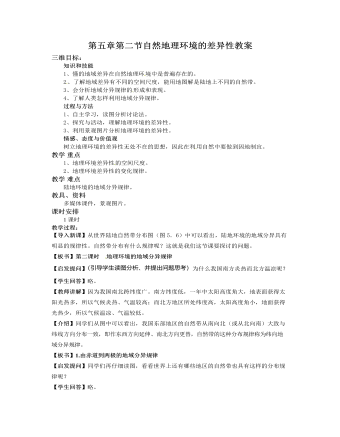
人教版高中地理必修1第五章第二节自然地理环境的差异性教案
【补充说明】我们这节课简要地分析了陆地环境的三种地域分异规律。实际上,世界上的任何事物有其一般性,也有它的特 殊性。在地带性分异规律的基础上,陆地环境因为受到海陆分布、地形 起伏等因素的影响,也会出现一些不规律的现象,这种现象称为非地带性。例如,我们在初中地理中学过绿洲。还记得什么叫绿洲吗?再比如,在南美洲的西海岸(太平洋沿岸),有一条狭长的(热带)荒漠带,而缺少热带草原带,热带雨林带主要是分布在赤道以北地区。这主要是受大的地形起伏的影响。因为南美洲西部是一列高大的安第斯山脉,受其影响,两边的气候状况不同,所以就出现了分布规律不同的自然带,这也是一种非地带性现象。【总结】有规律分布的自然带构成了全球和谐的自然环境整体。自然带之间错综复杂的、微妙的要素关系,有许多是人类还没有认识到的。因此,人类不能随意去破坏任何哪怕是极微小的环节,也许它 带来的影响会是全球性的。保护全球环境,人人有责。
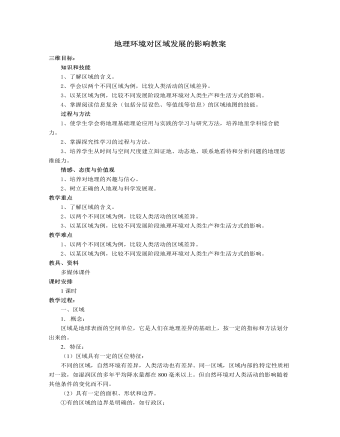
人教版高中地理必修3地理环境对区域发展的影响教案
(1)下面列出的是我国南北方传统民居的差异,分析形成这些差异的自然原因:——北方民居正南正北的方位观比南方强;——北方民居的墙体严实厚重,南方民居的墙体轻薄;——从北到南,民居的屋顶坡度逐渐增大,房檐逐渐加宽,房屋进深和高度逐渐加大。(2)下面列出的是我国南北方城市住宅搂的差异,分析导致这些差异的自然原因:——如果不考虑地价、建筑材料等因素,建同等面积的住房,北方的建筑成本比南方高 ;——建同样高度的多幢楼房,北方楼房的南北间距比南方大。点拨:本活动要求学生了解由于地理环境的差异造成南北方建筑物特点的不同,并由此认识地理环境 差异对人们生活的影响。(1)比较而言,北方的冬季寒冷而漫长,南方的夏季湿热而漫长。为了在冬季充分利用太阳光照和热量,北方民居正南正北的方位观比南方强。北方民居的墙体严实厚重,利用在冬季保温御寒;南方民居的墙体轻薄,利于在夏季通风透气。从北到南,年降水量逐渐增大,民居的屋顶坡度也逐渐增大(利于排水) ;随着对保温要求的降低和对通风纳凉要求的提高,民居的屋檐逐渐加宽,房屋进深和高度逐渐加大。
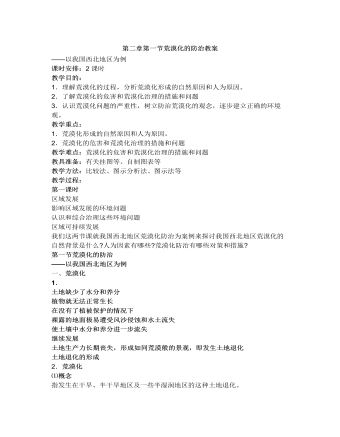
人教版高中地理必修3第二章第一节荒漠化的防治教案
1.根据下面的图文资料,说明前苏联垦荒区土壤风蚀的潜在自然背景。并说明人们的生产活动怎样加剧了这个过程。点拨:对图2.16的分析,要知道”垦荒地区”处于亚欧大 陆的中部偏北的地方,虽处于西风带但远离水汽来源,故降水稀少。从其周边的内陆湖“里海”、“咸海”的分布特点,可以推断,这是一个半荒漠向干草原的过渡地带,是一个生态环境比较脆弱的地区,其自然地理状况必定是寒冷、干旱、大风。2.20世纪60年代中期以来,前苏联在总结大规模垦荒经验教训的基础上,采取了一系列综合防护措施。仔细分析这些措施,你认为该地区防治荒漠化(土壤风蚀)的主要方向是什么?点拨:要善于将所列四项保护措施逐条进行分析,而后进行归纳,不难找出它们之间的共同的东西,那就是“抗旱、防风、保水、保土、保肥”。3.根据所学知识,你认为前苏联垦荒区防治荒漠化的对策与措施可以被我国的哪些地区所借鉴。
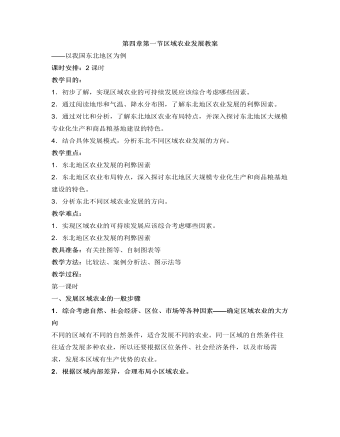
人教版高中地理必修3第四章第一节区域农业发展教案
1.根据下面的材料,归纳珠江三角洲发展基塘生产有利的地理条件。珠江三角洲地势低平,河网密布,降水充沛。北回归线从珠江三角洲的北部穿过。桑树和甘蔗主要分布于热带和亚热带。广州是古代海上丝绸之路的起始地之一。水产品在广东人的食物结构中占有较大的比重。点拨珠江三角洲地区发展基塘农业生产有利条件可以结合材料,归纳为三个方面:地形、气候、市场(当地和海外)具体分析略。2.图4.16所示的基塘生产将哪些产业联系起来?哪些副产品(或废弃物)被充分利用起来?这种联系对农村经济发展有什么作用?点拨基塘生产环节将种植业(桑、蔗等)、养殖业(养蚕、养鱼)、工业(丝厂、糖厂)等几种产业紧密的联系在一起。在此环节中,塘泥、蚕沙(蚕屎)、蚕蛹、缫丝、滤泥、蔗叶等副产品被充分的回收利用。养蚕业、蔗糖加工业同塘鱼养殖业紧密结合,作为一种综合的经营,几者之间相互依存、相互促进、扬长补短,有机地循环联系起来。
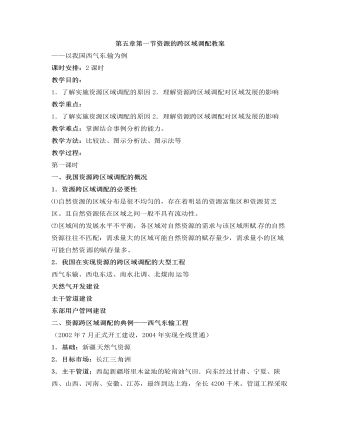
人教版高中地理必修3第五章第一节资源的跨区域调配教案
2.通过西气东输输送到上海的天然气,价格只相当于进口天然气的3/4、同等热值煤气的 2/3。你认为是否应该提高天然气的价格,以促进西部的发展。点拨:可以从不同方面分析。⑷对环境的影响①有利于改善东部地区的大气质量据监测显示,在同等热值的情况下,与煤炭相比,利用天然气作燃料几乎不产生二氧化硫、粉尘等污染物质,氮氧化物和二氧化碳的排放量也大为减少。长江三角洲地区的能源长期高度依赖煤炭,例如,上海市煤炭消费量占能源消费总量的70%。从西部地区输送来的天然气,可以部分替代煤炭。②为了最大限度减少对沿线地区生态环境的影响,西气东输工程在建设过程中,严格环境保护的要求。③在沿线农村地区推广使用天然气,可减少农民对薪柴的需求,从而缓解因植被破坏而带来的环境压力。
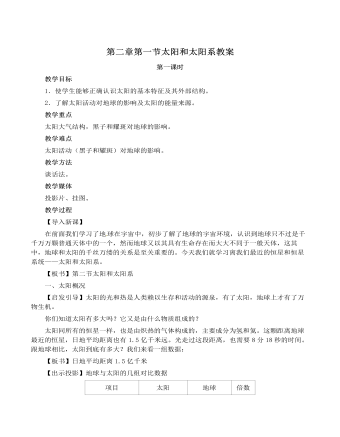
人教版高中地理选修1第二章第一节太阳和太阳系教案
教学过程【导入新课】在太阳系中,九大行星就好像一个家庭中的九个兄弟,有许多共性,今天,我们就一起来了解九大行星在运动特征和结构特征上的共同之处。【板书】3.九大行星的运动特征和结构特征【启发引导】请同学们一起阅读地图册上的“太阳系模式图”,读图分析:(1)九大行星在公转的方向、轨道等方面有什么共性?(2)图中符号“i”、“e”代表什么意思?这两组数字能说明什么问题?九大行星公转的方向相同,均为自西向东转,我们称为同向性。符号“i”表示轨道倾角。(简介黄道、黄道面、轨道倾角)各大 行星的轨道倾角都很小,只有水星和冥王星的大一些,最大也不过17°,说明九大行星的公转轨道近似在同一个平面上,我们称之为共面性。符号“e”代表公转轨道椭圆的偏心率,即焦点到椭圆中心的距离与椭圆半长轴之比,它决定椭圆的形状。偏心率越小,越趋向于圆,当偏心率为0时,轨道就是圆。

